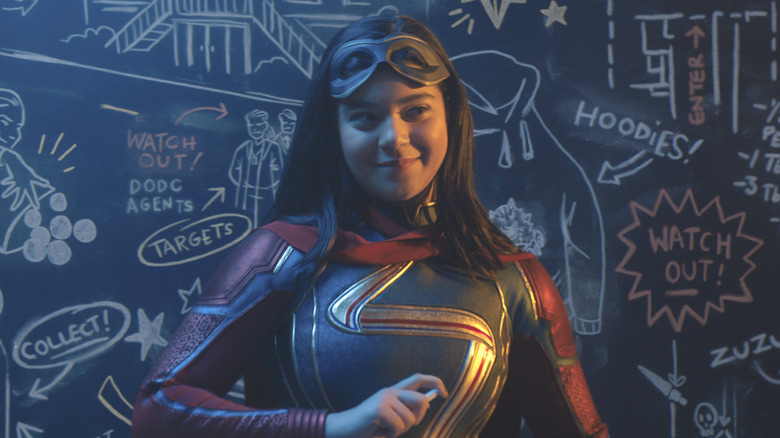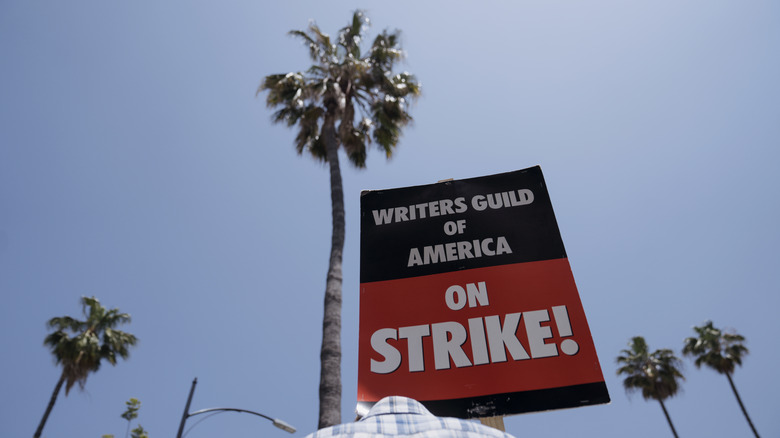Ms. Marvel, She-Hulk & Other MCU Writers Slam Marvel Studios Over Low Pay
Marvel Studios has been in a lot of hot water recently, whether it's overworking VFX artists or the general lackluster state of the Marvel Cinematic Universe. Unfortunately, the hits keep coming, as the WGA strike has inspired many writers to reveal how working on the studio's countless Disney+ series has left them criminally underpaid.
Last week, in preparation for "The Marvels," ABC announced the entirety of "Ms. Marvel" Season 1 would air on the network, conveniently filling a gap in the schedule created by the ongoing Hollywood strikes. In response to the news, "Ms. Marvel" writer A.C. Bradley took to Twitter, slamming Marvel Studios for its mistreatment of writers. "Hey Writers Guild of America West, let's make sure Disney & Marvel Studios pays the writers network residuals," they wrote. "Despite significantly rewriting all episodes & the WGA mandating I receive writing credits on three episodes... I was only paid a weekly rate & never paid script fees."
When asked how Marvel Studios could give Bradley writing credits yet not pay them script fees, the writer elaborated on the situation, saying, "We were brought on during production to revise the scripts. The original writers had already been paid & were no longer employed at the studio. Marvel didn't want to pay another fee."
It's not a good look for Marvel Studios, but given the current state of Hollywood, we can't say we're surprised. However, Bradley isn't the only writer coming forward.
Marvel Studios didn't treat the She-Hulk writers any better
In a very high-profile statement, Disney CEO Bob Iger called the SAG-AFTRA strike disruptive and damaging, describing the workers' demands for fair pay as "unrealistic." Naturally, this didn't sit well with many writers, including Cody Ziglar, who worked for Disney and Marvel Studios on "She-Hulk: Attorney at Law."
In response to Iger's comments, Ziglar took to Twitter, revealing how much he made off residuals for his work on the Disney+ series. "The residual check for my episode of 'She-Hulk: Attorney at Law' was $396," he said. The staggeringly-low paycheck is only made worse when you know that Ziglar wrote Episode 8, "Ribbit and Rip It," which introduces Daredevil (Charlie Cox) to the series and, effectively, the MCU. Since its premiere, fans collectively have agreed that Episode 8 is one of, if not the best, episode of "She-Hulk," with many loving the dynamic between Matt Murdock and Jennifer Walters (Tatiana Maslany). So, it's unbelievable that the creative mind behind that episode would receive such little compensation.
Residuals are a massive part of why the WGA is striking, so many rallied in support behind Ziglar to bring attention to how serious this issue is. @Jkbasante wrote, "That is appalling! Something's gotta give. You and all the writers, actors, etc. deserve to be treated way better. Standing in solidarity with you, fam." Many other users, like @jakestrick, @MoaneyLawson, and @calebjinright, called out Iger for his comments, which Ziglar's story proves are wildly incorrect.
What are script fees and residuals?
Both A.C. Bradley and Cody Ziglar deserve infinitely more pay for their work under Marvel Studios. However, their stories are just two of countless that have happened in Hollywood since the rise of streaming, and that's exactly what caused the Writers Guild of America and Screen Actors Guild to go on strike.
Script fees are generally self-explanatory. They are the payments producers give writers for their scripts and are included in a project's overall production costs. In their 2020 Minimum Basic Agreement for movies and TV, the WGA established strict guidelines for script fees, depending on how long the writing services took, with the lowest end being $1,331 for 15 minutes and the highest end being $6,198 for 90 minutes. For rewrites and backup scripts, those numbers jumped to $6,306. However, in A.C. Bradley's situation, Marvel Studios didn't pay them any script fees for their rewrites on "Ms. Marvel," seemingly only giving those to the show's original writers.
While script fees are upfront payments, residuals are long-term payments on the backend after a movie or TV show has premiered. Both actors and writers receive residuals after reruns on cable or when someone buys a physical copy of the media. However, with the rise of streaming, the profits from cable and physical media have dropped, meaning residuals have all but disappeared. It's a core issue the WGA and SAG-AFTRA strikes are meant to address, and with Bradley and Ziglar's stories in mind, it's an apparent problem that needs a solution.
This piece was written during the 2023 WGA and SAG-AFTRA strikes. To learn more about why writers and actors are currently on strike, click here for an up-to-date explainer from our Looper team.


